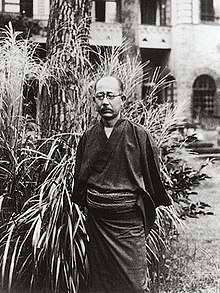Yūzō Yamamoto
Yūzō Yamamoto (山本 有三, Yamamoto Yūzō, July 27, 1887 - January 11, 1974) was a Japanese novelist and playwright. His real name was written "山本 勇造" but pronounced the same as his pen name. He was born to a family of kimono makers in Tochigi-city, Tochigi Prefecture.[1]
Yūzō Yamamoto | |
|---|---|
 At the house Mitaka, summer 1938 | |
| Born | Tochigi prefecture |
| Died | Shizuoka prefecture |
| Resting place | Tokyo |
| Other names | 山本 有三 |
| Occupation | novelist |
Biography
He studied German literature at Tokyo Imperial University. After graduating, he gained popularity for his solidly crafted plays, some twenty in all, notably: Professor Tsumura (Tsumura kyōju, 1919); The Crown of Life (生命の冠, Inochi no kanmuri, 1920); Infanticide (Eijigoroshi, 1920); and People Who Agree (同志の人々, Dōshi no hitobito, 1923). In 1926 he turned to novels, known for their clarity of expression and dramatic composition.[2] Later, with the writers Kan Kikuchi and Ryūnosuke Akutagawa he helped to co-found the Japanese Writer’s Association and openly criticized Japan's wartime military government for its censorship policies.
After World War II he joined the debate on Japanese language reform, and from 1947 to 1953 he served in the National Diet as a member of the House of Councillors. He is well known for his opposition to the use of enigmatic expressions in written Japanese and his advocacy for the limited use of furigana. In 1965 he was awarded the prestigious Order of Culture. He died at his summer villa in Yugawara, Kanagawa in 1974.[1]
Yamamoto’s large European-style house in Mitaka, Tokyo, was condemned by Supreme Commander for the Allied Powers with its power of eminent domain during the occupation period from 1945 to 1953. The mansion was then used as an archive and research lab by non-profit organizations for years, until it was converted into the City of Mitaka Yūzō Yamamoto Memorial Museum in 1996. There is also a museum dedicated to him in his hometown of Tochigi-city.
Selected works
- A Woman’s Life (女の一生, Onna no isshō, 1932)
- Towards the Truth (真実一路, Shinjitsu ichiro)
- The Crown of Life (生命の冠, Inochi no kanmuri, 1920) a play
- Two Women and War (戦争と二人の夫人, Sensō to futari no fujin)
- Kindred Spirits (同志の人々, Dōshi no hitobito, 1923) a play
- Waves (波, Nami, 1926)
- A Stone by the Roadside (路傍の石, Robō no ishi, 1937)
External links
- (in Japanese) Yūzō Yamamoto Memorial Museum (山本有三記念館)
References
- Yuzo Yamamoto Memorial Museum
- Jaroslav Průšek and Zbigniew Słupski, eds., Dictionary of Oriental Literatures: East Asia (Charles Tuttle, 1978): 206.